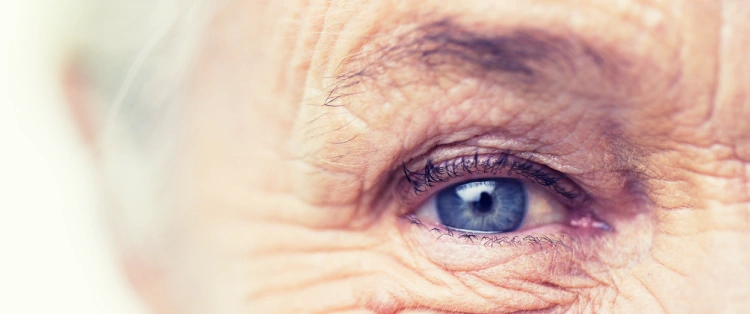What is Macular Degeneration?
15 March 2019

Macular degeneration (MD) refers to the deterioration of the central part of the retina (light-sensitive tissue at the back of the eye), which is called the macula.
It is one of the leading causes of vision loss in individuals aged 60 and above; which is why the condition is also referred to as age-related macular degeneration.
In this article we explore:
- Types of macular degeneration
- Symptoms of macular degeneration
- Causes of macular degeneration
- Treatment for macular degeneration
What is the Macula?
The macula is the small central part of the retina, located at the back of the eye. It’s responsible for detecting light and sending signals to the brain, which transfers them into images.
The macular provides the ability to see fine detail and colour in the central line of vision; whereas the rest of the retina provides peripheral vision (side vision).
Without a functional macula we would find it difficult to perform everyday activities such as reading, driving and recognising faces.
Types of Macular Degeneration
There are two types of macular degeneration; dry type and wet type. Almost all cases of macular degeneration begins as dry type and progresses into wet type. Both forms are bilateral (occur in both eyes), but may progress at different rates.
Dry Form:
Dry form is the most common type of macular degeneration, accounting for 85% of all cases. In dry macular degeneration, small deposits, called drusen, form on the retina, causing the macular to gradually deteriorate.
This results in blurred or reduced central vision. People who have dry form macular degeneration often find activities such as reading or driving most challenging.
Wet Form:
Wet form macular degeneration usually progresses from dry form. In these cases, abnormal blood vessels located under the retina start to grow toward the macular. These abnormal blood vessels then bleed and leak into the macular, causing it to pull away from its base.
Wet form macular degeneration can cause straight lines to look wavy, blurred vision and blind spots. It will eventually form a scar, which can lead to permanent loss of central vision.
Symptoms of Macular Degeneration
Symptoms are not always present when macular degeneration starts to form. Consequently the condition can go undetected, until it progresses.
One of the first and most common signs of macular degeneration is blurred vision. Individuals will often notice a blurry spot in the middle of their line of vision that gets larger or darker over time.
Common symptoms of macular degeneration include:
- Decreased quality of vision.
- Blurry areas in the centre of vision.
- Reduced colour distinction.
- Straight lines to appear bent.
Causes of Macular Degeneration
Macular degeneration is most common in individuals aged 60 and above. Studies have revealed that people aged 45- 65 have around a 2% chance of developing the condition, while people aged 75 and above have a 30% chance.
Although the cause is not always apparent, there are factors that have been said to heighten the risk of developing macular degeneration.
These include:
Ethnicity: Caucasians have the highest risk of developing macular degeneration. This could be due to the fact that light-coloured eyes do not deflect ultraviolet rays as effectively as dark eyes.
Smoking: Smokers have been said to be four times more likely to develop macular degeneration than non-smokers. This is because smoking reduces the amount of oxygen that gets delivered to the eyes.
High blood pressure: Similarly to smokers, high blood pressure limits the flow of oxygen to the eyes.
Heart disease: Individuals who have previously suffered a stroke, angina or a heart attack, are said to be more at risk of developing macular degeneration.
Sun exposure: Continued exposure to the sun’s ultraviolet rays can cause numerous eye related complications, including macular degeneration. It is strongly advised by optometrists that extra care is taken to look after eyes when exposed to UV rays.
Medications: It has been said that medications linked to the onset of macular degeneration include aspirin, nitroglycerin and certain beta-blockers.
Genetics: Researchers have suggested that there could be several genes that are related to the development of macular degeneration. These have not been proven.
Treatment
There is no known treatment for dry macular degeneration. In these cases, visual aids are used to help reduce its effects.
There is however treatment options available to relive the symptoms of wet macular degeneration. None of these will reverse the damage caused by the condition, but can be used to delay its progression.
Treatments for wet macular degeneration include:
Injections:
Wet macular degeneration can be treated by injecting a medication straight into the eye. This prevents abnormal blood vessels from growing, leaking and bleeding under the retina.
These injections usually need to be administered several times per year, or as advised by the optometrist.
Although the injections won’t completely eliminate wet macular degeneration, they can be administered to delay progression, stabilise the condition or in some rare cases improve some of the vision.
Retinal Laser Photocoagulation:
Wet macular degeneration can be treated with laser photocoagulation. This procedure is performed under local anaesthetic and uses heat to seal or remove leaking blood vessels in the retina.
Similar to injections, laser photocoagulation cannot restore lost vision, but it can delay further damage and prevent retinal diseases.
If you have wet form macular degeneration and think that this may be a suitable procedure for you, talk to your optometrist.
Ultralase
Here at Ultralase, we treat some individuals with Macular Degeneration. Those with dry MD can be treated, however those with wet MD cannot.
Treatment options Ultralase offer for dry Macular Degeneration:
LASIK and LASEK Laser Eye Surgery and Multifocal lens replacements are not suitable for the treatment of macular degeneration.
If you have any queries regarding the condition or if you would like to discuss your options please get in touch with our specialist team.
Back to Blog
